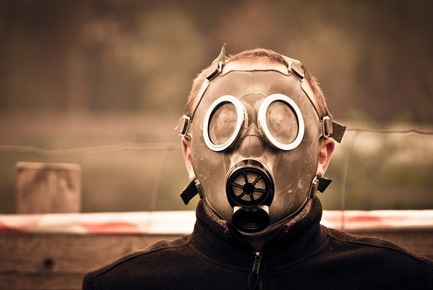No really, it's about writing, I promise.
This is the society I'm dumping a couple of characters into and watching them set the world on fire. And that's the story that's going to happen on the page.
But how do we get there? What has to happen, for the world to look so radically different to what it looks like now?
I'm trying to get back into the swing of writing blog posts, and today we're going to start with the five things I think you need to know to plan the end of the world.
1: What happens if...?
Right, so the first thing you need to do is pick your planetary disaster. If you're like me, and you're writing about people who are living in a society nothing like ours, but it's on earth, then you're probably going to be writing a world after the planetary disaster (for example, I'm writing a world after the icecaps have melted). Even if the 'end' or at least part of it happens off-screen, you still need to know what happened. This still needs to be plausible. Wikipedia is your friend, but be prepared to fall down the rabbit hole. There will be so many questions you need answers to that you never imagined when you started.
2: There are how many people in Asia?
Number two here is the kicker. It takes very little time, studying world population metrics, to realize this isn't sustainable. Like at all. At our current rate we're adding between 2 and 3 billion people every fifty years. So if our current population is 7.9 billion, then in 2400 it will be... 22.9 Billion people. That assumes people live roughly the amount their living now, and fertility rates stay about where they are now. We think we have overcrowding problems now... This population density means that if you spread everyone out there would be one human for every chunk of land measuring 140ft by 140ft. Over every bit of habitable land (not desert or mountain) on the planet. And that's today, not subtracting the land we'll lose in my scenario when the icecaps melt.
If you're slowing down your population growth you need to look at what it takes to actually make that number crawl backwards, and account for what that does to people. In the middle ages the Black Death killed roughly forty percent of the population in Europe and society slowed to a complete crawl. But that was only happening in Europe. If you're doing something to the entire world, be prepared to generate fallout everywhere. Even ten percent of your population dying unexpectedly will cause complete havoc.
3: How distant is distant?
You want a super advanced civilization that's doing things we're only dreaming about? Awesome, but when does that happen? Technology in the last two hundred years has sprinted. The nearly two thousand before that didn't see as many changes as the first fifty years of the nineteenth century. Especially not the kind of change that impacted people's daily lives. If you were born in 1900, you grew up in a house that might not have changed in a hundred years. If you had children at 30, you probably lived in a house with plumbing, heat, electricity, a radio, a telephone (or a shared one in your apartment building) and a refrigerator. When you were sixty and had grandchildren there was a TV in the house, and maybe a microwave and a vacuum and an electric washer. If you were lucky you had health insurance.
Now project all of that forward. What did your house look like when you were twelve compared to what it looks like now? What do you think your grandchild's house will look like? If you want flying cars and nano-tech nobody thinks is unusual you probably need to be at least a hundred years in the future. Maybe longer. Or give Elon Musk some more money.
4: Why is anything the same?
While you're changing all of that, what is staying the same? Are racial divides still the same? Because if it's three hundred years in the future and our planetary cultural lines haven't changed at all, that's going to take some explaining. What about world religions? Holidays? If it's only a hundred years in the future and absolutely everything is different you're going to have to explain that, too. Because today we know things and have cultural references that are a hundred years old.
5: What next?
Just like starting your story after the end of the world means you have to know how the world ended, when you get to the end of your post-apocalyptic or apocalyptic tale you need to know where the world is going next. Maybe not in great detail. Maybe not at a global scale, but if you're going to close the book and the universe is supposed to stop at the end... Well, that's a special kind of book, and the reading audience for it is pretty small. Most of us want some kind of hope for life after the ending.
So there you go, here's what I've learned from planning the end. Oh, and I'll add one more for good measure.
6: Buy yourself some comfort food.
This crap gets depressing really fast.


 RSS Feed
RSS Feed
